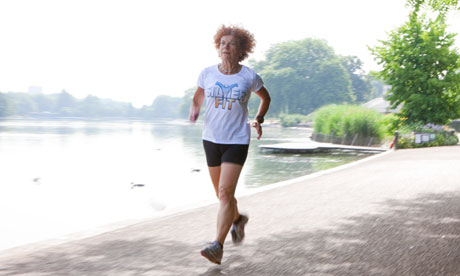
I'm 70 years old, just, and I live in central London. I was never much into sport: I was in social work for 50 years, and I only did a half marathon at 52 because the route took in some of my old haunts at Nottingham University.
I was living in Nottingham at the time and had joined a tiny running club, the South Notts Pacers, after a doctor's advice that all women should build up their calcium levels with impact exercise when pre-menopausal. Years later, when I was post-menopausal, I asked him: "Can I give up now?" only to be told load-bearing exercise was now even more important.
I was also 52 when my husband died. My small running group was fantastic. Running is therapeutic – you can run and talk, run in silence or just run while someone talks to you. Somehow, you cut to the quick when you run, there's no room for bullshit when plodding uphill. Running proved infinitely more effective than grief counselling. I was the lucky one, and I determined to make the most of life. When my running club decided to disband, they secured their one club place in the London Marathon and gave it to me. How could I let them down? Ten marathons later, I am hungry for more – knees permitting.
I did, though, have doubts about pounding the streets for ever, so I followed my elder son into triathlon and my first London Tri, with an appalling slow swim. Later, someone suggested I try duathlons – run 10km, bike 40km and run 5km. So a month later I lined up at the start of my first, overhearing two women commenting that "there is an L this year". I looked down and realised I was the one with an L marked on my leg – apparently denoting my advanced age. But as the only person in the 60-65 age group, I qualified for my first World Duathlon in Switzerland. Apprehensive in the cold, I biked cautiously down the first hill, to be overtaken by somebody I knew from the Serpentine running club shrieking with delight, "Come on, Eddie – go for it!" So I raced down after her and one by one those older women dropped out, unused to the cold and wet. I became the elderly duathlon world champion in my age group.
I'm not quite sure how I got into entering an Ironman in Lanzarote – maybe after watching my son do it, I thought it could be fun. In 2011, we did it together, the cameras following the oldest female, my son doing everything to avoid mother/son publicity. I loved the race, especially the fish in the 3.8km swim. And after the windy, hilly 180km bike route, the marathon run in Puerto del Carmen was such fun. From bar to bar along the drag, three times, each time the support increasingly inebriated and enthusiastic. As the first and only person in my age category I qualified for the World Ironman Championship in Kona, Hawaii.
In late 2011 some knee pain led to MRI scans and devastating advice from a consultant: "Stop running, now." So I stopped – for six months. But I missed it – not the racing, but the gentle jogs along the Thames that I love. I compensated by cycling the Nove Colli, a 200km bike race that goes up nine Italian hills. The dream that I could swim and then run again slowly resurfaced. I tried gentle running in those soft, beautiful coastal pinewoods and celebrated completing the race by twisting the night away – my only sporting achievement at university had been representing it at the twist – not the best medication for dodgy knees.
I came home and sought out a brilliant physio. I set about increasing my strength and balance to minimise pressure on the knees with endless one-legged ups and downs. But it's a balancing act, and my daughter warned I should "avoid risking your long term future mobility, Mum, for some short term gain". But then came the Olympics – watching the triathlon in Hyde Park and the 10km open water swim in the Serpentine – where the sprint-distance world triathlon championship will be held in September. I had to be there, at that fantastic venue. It also motivated the rebranding of the charity I help to organise: Silverfit is aimed at promoting lifelong fitness.
So in May 2013 I finished the Ironman in Lanzarote – the oldest woman from the UK to complete any Ironman, and I even managed a personal best on the swim. Time, though, was not the issue – I just wanted to finish and get the T-shirt and rucksack. I had enough energy left two weeks later to do an Olympic-distance tri in Chester – one of three races in which age groupers could qualify for Hyde Park. It was my first river swim, and 875m against the current of the river Dee was a challenge, but I qualified. Hyde Park here I come! And what a privilege it will be to swim where my grandmother, who was Churchill's cook, swam on Christmas Day.
I'm often asked what drives me. I want to encourage other women to get the fun out of sport and exercise that I have had. The Olympic legacy must focus more on older people reaping the health and social benefits and reducing the costs of our ageing population. It's not to get us oldies living longer, but enable us to live life to the full, independently and happily, looking good for our age with Queen on the iPod: don't stop me now.

